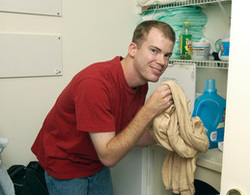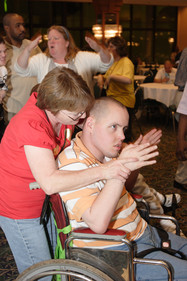Developmental Homes
Child Developmental Home (CDH)

A CDH provider opens their home to provide a foster home setting to a child or children (0-17 years of age) in need. CDH providers can support up to three children in their home at one time. Most children placed in CDHs are receiving services through DES/DDD and have been diagnosed with a developmental disability. Developmental Disabilities can include, but are not limited to Cognitive Disability, Epilepsy, Cerebral Palsy and Autism. Children placed in CDHs can be temporary or long term, depending on the case plan of the child. As a CDH provider you are expected to follow and support the case plan of the child or children placed in your home.
To learn more about the general requirements to become a CDH provider, please click here.
To learn more about the general requirements to become a CDH provider, please click here.
Adult Developmental Home (ADH)

An ADH provider opens their home to provide a foster home setting to an adult or adults (18 and older) in need. ADH providers can support up to three adults in their home at one time. All adults placed in ADHs are receiving services through DES/DDD and have been diagnosed with a developmental disability. Developmental Disabilities can include, but are not limited to Cognitive Disability, Epilepsy, Cerebral Palsy and Autism. Adults placed in an ADH are usually long-term placements.
To learn more about the general requirements to become an ADH provider, please click here.
To learn more about the general requirements to become an ADH provider, please click here.
Home and Community Based Services (HCBS)
Attendant Care

Direct care workers providing this service supply needed services in order for an individual to remain in his/her home and/or participate in work/community activities. This service may be provided in the individual’s home or the community. The goal of this service is to assist the member to attain or maintain safe and sanitary living conditions and/or maintain personal cleanliness and activities of daily living. Attendant care tasks may include offering assistance with bathing, oral hygiene, toileting, dressing, eating and preparing meals, participating in community activities, cleaning and laundry.
To learn more about this service, please click here.
To learn more about this service, please click here.
Habilitation

Direct care workers providing this service provide a variety of interventions designed to maximize the functioning of persons with developmental disabilities. Services are designed to assist individuals in acquiring, retaining and improving the self-help, socialization and adaptive skills necessary to reside successfully in home and community-based settings. This service may be provided in the individual’s home or the community. Habilitation tasks may include assistance and training related to personal and physical needs and routine daily living skills, implementing strategies to address behavioral concerns, ensuring that the health needs of the individual are being met, providing opportunities for training and/or practice in basic consumer skills such as shopping, banking and money management and assisting individuals in utilizing community transportation resources to support the consumer in all daily living activities.
To learn more about this service, please click here.
To learn more about this service, please click here.
Respite

Direct care workers providing this service provide short-term care and supervision consistent with the health needs of the person to supplement care to provide a safe living environment and/or to support or relieve caregivers for the benefit of the person. This service may be provided in the individual’s home, the community, or the direct care workers home only if the home has been inspected and approved by the Department of Economic Security. Respite tasks may include providing for the social, emotional and physical needs of the individual, ensuring that the individual receives medication as prescribed, providing first aid and appropriate attention to injury and illness, ensuring provision of food to meet daily dietary needs and assisting the individual in utilizing transportation to support the individual in all daily living activities.
To learn more about this service, please click here.
To learn more about this service, please click here.
